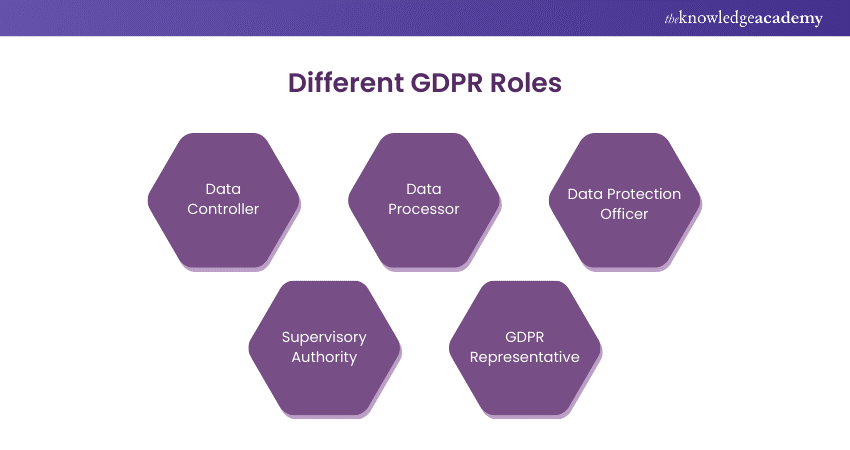We may not have the course you’re looking for. If you enquire or give us a call on +64 98874342 and speak to our training experts, we may still be able to help with your training requirements.
Training Outcomes Within Your Budget!
We ensure quality, budget-alignment, and timely delivery by our expert instructors.

The European Union (EU) General Data Protection Regulation (GDPR) stands as a pivotal framework, safeguarding personal data and privacy in the European Union (EU). GDPR plays a key role in the effective implementation of data protection rights by ensuring organisations comply with its stringent requirements. But why are these roles so crucial? Who are the key players responsible for upholding the standards of data protection? As we uncover the layers of GDPR, understanding the GDPR Roles becomes essential.
Their responsibilities form the backbone of data security and compliance. Dive into our blog on GDPR Roles to uncover the significance of each role and how they contribute to the greater good of data protection. Don’t miss out on this insightful exploration – continue reading below to become well-versed in the world of GDPR.
Table of Contents
1) Different GDPR Roles
a) Data Controller
b) Data Processor
c) Data Protection Officer
d) Supervisory Authority
e) GDPR Representative
2) Conclusion
Different GDPR Roles
The European Union (EU) General Data Protection Regulation (GDPR) is a comprehensive Data Protection law from the EU that mandates how companies must handle personal data. It emphasises transparency, accountability, and consumer rights. The personnel responsible for executing GDPR, including Data Controllers, Processors, and Data Protection Officers, play critical roles. They ensure that organisations comply with legal obligations, manage data responsibly, protect against breaches, and uphold the rights of individuals, thereby fostering trust and security in the handling of personal data. Let us look at these roles in more detail:

1) Data Controller
The Data Controller plays a crucial part under the GDPR, despite having limited powers in the enforcement of the data processing rules. It is this entity that sets the rules for how and why personal data is processed. As the main guardian of compliance with respect to data safety, the Data Controller must oversee the security protecting personal data, consents were obtained in a correct manner and the processing of the data whether be it for storing or transaction, was carried out transparently. The Data Controller should be notified by the supervisory authority within a period and those affected should be informed without delay. Moreover, they must monitor and log the details of data handling practices as evidence of conformity with the GDPR rules
2) Data Processor
A Data Processor is the agent in charge of the processing personal data as in contrast with a Data Controller. As opposed to the Controller, the Processor is not authorised to make decisions on what and when the personal data is being processed. They are responsible for executing processing operations on behalf of the Data Controller. Data Processors must report with security and compliance with the contractual terms which were given to them by the Controller. Lastly, they are expected to support and assist the Controllers in the exercise of data subject rights; besides, they also prepare breaches reporting to supervisory authorities.
Understand Data Protection and implement EU GDPR compliant programs by signing up for GDPR Training now!
3) Data Protection Officer
The Data Protection Officer (DPO) is stipulated in the General Data Protection Regulation (GDPR) for those companies that have large volumes of sensitive data or regularly and systematically monitor the subject of data privacy. The DPO is responsible for developing and implementing the Data Protection plans of the organisation and for complying with the GDPR requirements. The responsibilities include making the organisation and its employees aware of compliance, training staff engaged in data processing, and performing internal audits. Furthermore, the DPO does serve as the primary contact between the company and GDPR Supervisory Authorities.
4) Supervisory Authority
Supervisory Authorities (SAs) is an independent public authority established by each state. It ensures that the GDPR is enforced across their respective domains in order to guarantee the processing operation is done lawfully, fairly, and transparently. SA receives reports from data subjects, checks up compliance issues, and might even impose fines on those violating GDPR regulation. For their parts, they ensure data security access control and may require the suspension of data transfers to non-EU member states.
5) GDPR Representative
A GDPR representative is absolutely required by non-EU enterprises which are collecting or processing the personal data of EU citizens. The GDPR representative who act as the local point of access within the EU facilitates communication and compliance with the General Data Protection Regulation (GDPR). Among their tasks are to fulfil a mediating position between supervisory authorities and data subjects in this activity. The representative will indeed function efficiently by answering and forwarding complaints, facilitating the enforcement of data subjects' rights, and ensuring that the Data Controller or Processor conforms to the GDPR norms. The role that becomes crucial here is the one connecting the communication gap and keeping the compliance of non-EU companies in the framework of GDPR.
Conclusion
Understanding who the Data Controllers, Processors, DPOs, and other various roles within the GDPR Framework is crucial for compliance and for establishing effective Data Protection strategies. These roles form the foundation of adherence to GDPR and help maintain trust in today's digital economies.
Enhance your understanding of GDPR requirements. Join our EU GDPR Awareness Training today!
Frequently Asked Questions

The four key components of GDPR are:
1) Data Protection principles
2) Rights of data subjects
3) Obligations of Data Controllers and Processors
4) Enforcement and penalties for non-compliance with the regulation.

The GDPR rules are set by the European Union. They were drafted and passed by the European Parliament, the Council of the European Union, and the European Commission to protect data privacy and security.

GDPR audits are primarily conducted by Data Protection Authorities (DPAs) in each EU member state. These authorities ensure compliance, investigate breaches, and enforce regulations within their respective jurisdictions.

The Knowledge Academy takes global learning to new heights, offering over 30,000 online courses across 490+ locations in 220 countries. This expansive reach ensures accessibility and convenience for learners worldwide.
Alongside our diverse Online Course Catalogue, encompassing 17 major categories, we go the extra mile by providing a plethora of free educational Online Resources like News updates, Blogs, videos, webinars, and interview questions. Tailoring learning experiences further, professionals can maximise value with customisable Course Bundles of TKA.

The Knowledge Academy’s Knowledge Pass, a prepaid voucher, adds another layer of flexibility, allowing course bookings over a 12-month period. Join us on a journey where education knows no bounds.

The Knowledge Academy offers various GDPR Trainings, including the Certified Data Protection Officer (CDPO) Course, GDPR Awareness Training and Data Privacy Awareness Course. These courses cater to different skill levels, providing comprehensive insights into Differences Between GDPR and the Data Protection Act.
Our IT Security and Data Protection Blogs cover a range of topics related to GDPR, offering valuable resources, best practices, and industry insights. Whether you are a beginner or looking to advance your GDPR Compliance skills, The Knowledge Academy's diverse courses and informative blogs have got you covered.
Upcoming IT Security & Data Protection Resources Batches & Dates
Date
 Certified Data Protection Officer (CDPO)
Certified Data Protection Officer (CDPO)
Fri 10th Jan 2025
Fri 28th Feb 2025
Fri 4th Apr 2025
Fri 16th May 2025
Fri 11th Jul 2025
Fri 19th Sep 2025
Fri 21st Nov 2025







 Top Rated Course
Top Rated Course



 If you wish to make any changes to your course, please
If you wish to make any changes to your course, please


